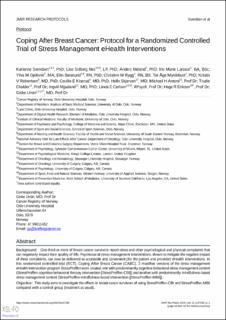| dc.contributor.author | Svendsen, Karianne | |
| dc.contributor.author | Nes, Lise Solberg | |
| dc.contributor.author | Meland, Anders | |
| dc.contributor.author | Larsson, Ine Marie | |
| dc.contributor.author | Gjelsvik, Ylva M. | |
| dc.contributor.author | Børøsund, Elin | |
| dc.contributor.author | Rygg, Christine Marie | |
| dc.contributor.author | Myklebust, Tor Åge | |
| dc.contributor.author | Reinertsen, Kristin V. | |
| dc.contributor.author | Kiserud, Cecilie E. | |
| dc.contributor.author | Skjerven, Helle | |
| dc.contributor.author | Antoni, Michael H. | |
| dc.contributor.author | Chalder, Trudie | |
| dc.contributor.author | Mjaaland, Ingvil | |
| dc.contributor.author | Carlson, Linda E. | |
| dc.contributor.author | Eriksen, Hege Randi | |
| dc.contributor.author | Ursin, Giske | |
| dc.date.accessioned | 2023-07-26T12:34:47Z | |
| dc.date.available | 2023-07-26T12:34:47Z | |
| dc.date.created | 2023-06-01T09:52:18Z | |
| dc.date.issued | 2023 | |
| dc.identifier.citation | Svendsen, K., Nes, L. S., Meland, A., Larsson, I. M., Gjelsvik, Y. M., Børøsund, E., Rygg, C. M., Myklebust, T. Å., Reinertsen, K. V., Kiserud, C. E., Skjerven, H., Antoni, M. H., Chalder, T., Mjaaland, I., Carlson, L. E., Eriksen, H. R. & Ursin, G. (2023). Coping After Breast Cancer: Protocol for a Randomized Controlled Trial of Stress Management eHealth Interventions. JMIR Research Protocols, 12, Artikkel e47195. | en_US |
| dc.identifier.issn | 1929-0748 | |
| dc.identifier.uri | https://hdl.handle.net/11250/3081451 | |
| dc.description.abstract | Background: One-third or more of breast cancer survivors report stress and other psychological and physical complaints that can negatively impact their quality of life. Psychosocial stress management interventions, shown to mitigate the negative impact of these complaints, can now be delivered as accessible and convenient (for the patient and provider) eHealth interventions. In this randomized controlled trial (RCT), Coping After Breast Cancer (CABC), 2 modified versions of the stress management eHealth intervention program StressProffen were created: one with predominantly cognitive behavioral stress management content (StressProffen-cognitive behavioral therapy intervention [StressProffen-CBI]) and another with predominantly mindfulness-based stress management content (StressProffen-mindfulness-based intervention [StressProffen-MBI]).
Objective: This study aims to investigate the effects in breast cancer survivors of using StressProffen-CBI and StressProffen-MBI compared with a control group (treatment as usual).
Methods: Women diagnosed with breast cancer (stage I-III, unequivocally human epidermal growth factor receptor 2–positive or estrogen receptor-negative tumors) or ductal carcinoma in situ (DCIS) aged 21-69 years who completed the Cancer Registry of Norway–initiated health survey on quality of life are invited to the CABC trial about 7 months after diagnosis. Women who give consent to participate are randomized (1:1:1) to either the StressProffen-CBI, StressProffen-MBI, or control group. Both StressProffen interventions consist of 10 modules of stress management content delivered through text, sound, video, and images. The primary outcome is between-group changes in perceived stress at 6 months, assessed with Cohen 10-item Perceived Stress Scale. The secondary outcomes comprise changes in quality of life, anxiety, depression, fatigue, sleep, neuropathy, coping, mindfulness, and work-related outcomes approximately 1, 2, and 3 years after diagnosis. Long-term effects of the interventions on work participation, comorbidities, relapse or new cancers, and mortality will be assessed using data from national health registries.
Results: Recruitment is scheduled from January 2021 to May 2023. The goal is to recruit 430 participants (100 in each group). As of April 14 2023, 428 participants have been enrolled.
Conclusions: The CABC trial is possibly the largest ongoing psychosocial eHealth RCT in patients with breast cancer. If 1 or both interventions prove to be effective in reducing stress and improving psychosocial and physical complains, the StressProffen eHealth interventions could be beneficial, inexpensive, and easily implementable tools for breast cancer survivors when coping with late effects after cancer and cancer treatments. | en_US |
| dc.language.iso | eng | en_US |
| dc.rights | Navngivelse 4.0 Internasjonal | * |
| dc.rights.uri | http://creativecommons.org/licenses/by/4.0/deed.no | * |
| dc.title | Coping After Breast Cancer: Protocol for a Randomized Controlled Trial of Stress Management eHealth Interventions | en_US |
| dc.type | Peer reviewed | en_US |
| dc.type | Journal article | en_US |
| dc.description.version | publishedVersion | en_US |
| dc.rights.holder | © Karianne Svendsen, Lise Solberg Nes, Anders Meland, Ine Marie Larsson, Ylva M Gjelsvik, Elin Børøsund, Christine M Rygg, Tor Åge Myklebust, Kristin V Reinertsen, Cecilie E Kiserud, Helle Skjerven, Michael H Antoni, Trudie Chalder, Ingvil Mjaaland, Linda E Carlson, Hege R Eriksen, Giske Ursin. | en_US |
| dc.source.volume | 12 | en_US |
| dc.source.journal | JMIR Research Protocols | en_US |
| dc.identifier.doi | https://doi.org/10.2196/47195 | |
| dc.identifier.cristin | 2150691 | |
| dc.source.articlenumber | e47195 | en_US |
| cristin.ispublished | true | |
| cristin.fulltext | original | |
| cristin.qualitycode | 1 | |

